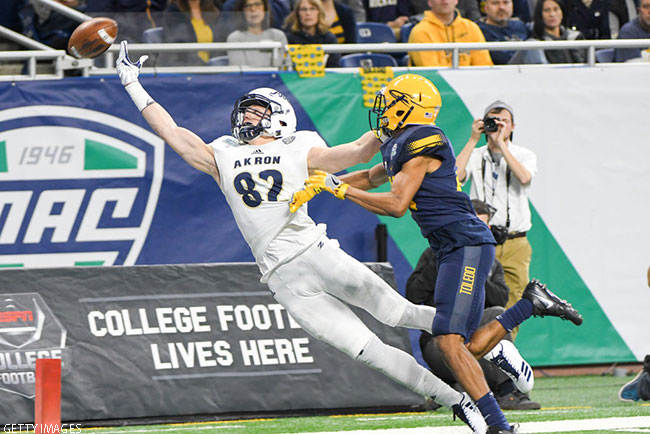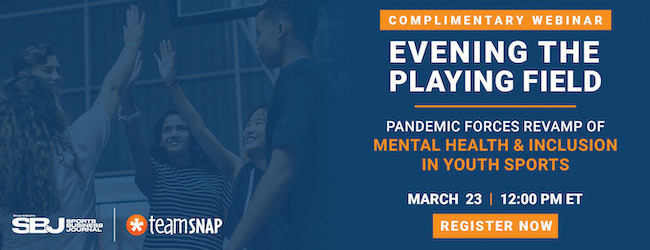In case you were wondering whether the influx of legal sports betting would dampen America’s enthusiasm for digitized brackets -- fear not. ESPN reports it collected a record 17.3 million completed brackets for its men’s tournament challenge, with 30,000 brackets per minute flooding in as the 12:15 tipoff of yesterday’s first game approached. NCAA.com reported more than 20 million brackets handled between its site, ESPN, Yahoo and CBS.
There will be handle records set at U.S. sportsbooks these next two weeks. But rest assured, the bracket remains alive and well. Although, mine? Not so much.
PointsBet sees value in March Madness microbets
With New Mexico State trailing UConn 6-5 in what would turn out to be a stunning first-round NCAA Tournament upset last night, PointsBet had odds on which team would score the 15th, 16th, 17th and 18th points of the game, making good on a promise to roll out for March Madness the “lightning bets” that it touted during the NFL and NBA seasons.
It’s an offering that the sportsbook sees as a differentiator during what will be the most heavily bet two weeks of the year. A fast-paced form of live betting that might lure in-play devotees who have been frequenting its larger competitors. FanDuel, DraftKings, BetMGM and Caesars all had live odds on the trinity typically offered by all books -- spread, moneyline and total -- all adjusting as the score changed.
But only PointsBet took the extra step of offering microbets, a surprising development considering the oft-promoted assumption that such wagers relied on reliable, near real-time official data -- a product that does not exist in college sports. Using multiple sources of unofficial data to power the same proprietary tech that it used to create microbets using official NFL and NBA data, PointsBet is gambling that it can keep up the pace without enduring outages that lock out bettors when the score starts changing, or leaving itself open for big losses because its algorithms set ill-advised odds.
Will college conference data rights be worth the cost?
If March Madness microbets work, it makes you wonder whether PointsBet will think it’s worth the premium cost of official data when the schools finally begin packaging up their live statistical data for sale to sportsbooks, as their counterparts do.
“That’s the million dollar-question,” said Eric Foote, who joined PointsBet USA as its COO in 2020 after more than a decade at CBS Sports Interactive’s college group. “And I don’t think any operator has that answer at this time, until we see the quality of the data, the latency of the data and the breadth of the data. That’s the first question we’re going to have to analyze. And then, secondly, how will the conference and their official data provider go to market with it? What else will they wrap up into it?
With the pro leagues, use of IP, use of marks in the mobile app, different marketing opportunities -- there are things we do with the professional leagues that it will be interesting to see what the conferences are willing to do.”

MAC-Genius deal an important first mover in college
Things finally began moving on the college data front earlier this month, when the MAC announced a five-year deal to distribute its live statistical feed through Genius Sports. It was a heavy lift that required the 12 MAC schools to pool their individual rights and then bless Genius to distribute them not only to media companies, but also to sportsbooks, who have paid premium rates for those official feeds, which they use to adjust odds and settle bets.
It was the first tangible move of what likely will become an important movement. Last year, the NFL and NBA each struck deals that will pay them upward of $100 million annually for their data rights. That got the attention of the college conferences, which wondered whether they might be sitting idly on similarly valued rights.
The NFL is the most bet on sports property in America. But college football is second, ahead of the NBA. College basketball ranks fourth. When you combine the two sports, college betting dwarfs all the pro leagues. And the volume of games produced by 130 FBS football and 352 D-I basketball programs is staggering -- about three times as many college football games as the NFL and more than four times as many college basketball games as in the NBA.
The trouble is that college sports is highly fragmented, particularly when it comes to the control of data. While there is some debate over rights ownership, the consensus is that the schools hold the keys to the data from their home games, the conferences own their tournaments and championship games, the NCAA owns March Madness and other championships and the CFP is its own thing entirely.

The Genius deal was a heavy lift that required the 12 MAC schools to pool their individual rights
Work to be done in convincing college scene on data deals
While university presidents and ADs will have the final say over how their data is used, there’s still another conversation to be had with each school’s multimedia rightsholder, such as Learfield, Playfly Sports or JMI, which hold the marketing rights and IP that many sportsbooks would like to see included in a data package.
This is the convoluted, and often conflicted, world that the data companies -- Genius Sports, Sportradar, IMG Arena and startup Tempus Ex Machina -- have been navigating in the last year as they jockey to secure rights to the most-valuable schools and events, while the conferences try to bring ADs and university presidents to unanimity on a matter that involves gambling, a topic foreign and perilous to many of them.
The challenge for the data companies: To convince the powers that be in college that, along with providing millions in revenue from an untapped stream and building engagement in their games, the distribution of their data will create visibility that makes point-shaving and the passing of inside information easier to catch.
“When we think about data and the distribution of data, we think about commercial opportunities; the opportunity to generate revenue and monetize,” said Sean Conroy, Exec VP/North America for Genius Sports. “But we also think about the opportunity to better engage fans. And we think about visibility, transparency and to a certain degree control. The control of that data and a more formal engagement with sports betting is something I would expect most college institutions are looking at today.”

Process for college-level data deals a methodical one
At first glance, you’d think the decision to distribute official data to sportsbooks would be an easy one. Not only is it lucrative, it adds transparency that makes it harder to fix games. That’s the argument the pro leagues make when they lobby that it be required in sports betting legislation.
Many in college sports think that will resonate with university presidents, eventually. But it’s a process. And, in academia, those play out far more slowly than you’d expect -- especially when the goal is unanimity. “Why some of those conferences may be waiting -- you don’t want to be the first conference to announce a deal that says, well, 10 of our 12 schools will be participating,” said Matt Holt, president of U.S. Integrity, a data monitoring service that also serves as a consultant on broader sports betting matters to schools and conferences. “You really want to have everybody in.”
Consider the deal announced this week that gave the Pac 12’s data rights exclusively to Tempus Ex Machina. While ambitious, and perhaps even disruptive, it does not give Tempus clearance to distribute to sportsbooks. I’m tempted to write “yet”, but in college sports, “yet” can be a dot way off in the distance.
Schools need to be ready to include logos, sponsor rights for sportsbooks
In his conversations with schools and conferences, Sportradar Head of Strategic Partnerships Kyle McDoniel has laid out the lucrative possibilities for those willing to package their data similarly to the pro leagues. But he also has told the groups that the company understands if they aren’t ready to include every school’s logo, sponsorship rights or video in packages to sportsbooks -- or even if they’re not quite there on distributing data to sportsbooks -- as long as they understand that without those pieces, they won’t command as high a price.
“We’re taking a fairly deliberate approach in making sure that the deals we put together are going to make sense for the schools; that we’re going at the pace they need to go at,” said McDoniel, who joined the company in 2020 after lengthy stints at Yahoo Sports, Fox Sports and ESPN. “If we need to take some things from a step-wise fashion, if we can’t do everything that we might do with a partner like the NBA right out of the gate, then let’s figure out what are the right things we can do to get started and then progress it in a way that makes sense for everybody.”
McDoniel also offers up a cautionary tale likely to resonate with ADs. “Not unlike the NIL situation, you can either take a proactive stance on something and try to mold it in the fashion you’d like it to end up in, or you can let it happen and wait to sort it out after the fact,” McDoniel said. “It’s fairly obvious what everybody would likely prefer. We’re encouraging the partners we’re working with to not wait on starting to figure this out."
Expect more college data deals by fall; Could NCAA even sell March Madness?
Sources in both the data world and college sports have told us to expect three to five more deals to be in place in time for next football season, with the pace of negotiations picking up after March Madness ends and each conference gathers for meetings at the start of summer.
There is even some optimism -- or maybe it’s hope; hard to tell -- that the NCAA could be warming to the idea of letting Genius Sports sell the motherlode of all college data, March Madness, to sportsbooks in time for next year’s tournament. It remains to be seen how sportsbooks that have figured out how to take in-game bets without it will respond.
“When you start to think about all the different data providers out there -- adding Tempus Ex in the fold with the Pac 12 -- it just creates more challenges to ingest and work with multiple different providers,” Foote said. “It can be done. But I think only select operators will have the ability or even the patience to continue to do that. It’s going to go back to what’s the larger package looking like. Can the use of official data be mandated? That’s a big question. And without the NCAA’s involvement in official data or the sports betting category, what organizational body will mandate this and can that be done.
It’s going to take time for that to play out in college.”

MSG Networks leans further into betting with more Knicks simulcasts
Coming off a pair of successful, DraftKings-sponsored betting simulcasts of Knicks games in the days leading up to the Super Bowl, MSG Networks will roll out three more BetCasts timed to coincide with March Madness, beginning with tonight’s Wizards-Knicks game on MSG Plus.
The RSN also will produce BetCasts on March 28 and March 30, the week leading into the Final Four. Talent will include hosts from MSG’s betting-focused weeknight studio shows “The Bettor Half Hour” (Alex Monaco) and “The Betting Exchange” (Jeff Johnson and Erik Coleman), along with handicappers Alex Glaze, Adam Ronis and Sean Little and "MSG PM" co-host Kazeem Famuyide.
“We’ve been looking to innovate in this alternative broadcast space for a while,” said Kevin Marotta, Senior VP/marketing and content strategy for MSG Networks. “This year, the simulcasts have been around these big moments in betting. We thought it was a good idea to get in front of (people interested in betting). ... Our simulcasts will be focused on those (Knicks) games, but at halftime we’re going to jump in and talk about March Madness a little bit. We think it’s another really good opportunity for us to innovate around a topic people are discussing and care about.”
As presenting sponsor, DraftKings gets extensive brand exposure and will be the only sportsbook running spots during the simulcast. A range of sportsbooks advertise across other MSG telecasts.
Fan habits continue to shape MSG's approach with new telecasts
The simulcasts are yet another example of MSG’s increased emphasis on developing betting-focused programming now that all its viewers can bet on sports legally from their couches. MSG added its first half-hour betting show, “The Betting Exchange," in the 5:30pm ET slot at the start of football season and added “The Bettor Half Hour” in front of it in October.
“With each one we had learnings and we’re looking to evolve them,” Marotta said. “One of the learnings is, people who are curious and interested bettors aren’t just looking for a bunch of information about picking that night’s games. They’re looking for entertainment. So sometimes content can play both before a game during that prime betting window as well as after the game, where you talk about approach to futures or approach to hedging and different trends instead of just talking about specific bets. As we went through the year, we started to see that there were more opportunities around some general topics in the space as opposed to specific content around actionable bets you can place each night.”
Expect all the networks and RSNs to be brainstorming ways to create more compelling shoulder programming and develop alternate streams around games and events in the coming months, with lots of ramp-up come next football season.
January sports betting handle in U.S. will push $9.5 billion
With all but Arizona reporting, we can about close the book on January with a record $9.2 billion sports betting handle, which likely means a U.S. total that will fall just short of $10 billion. The update from our last issue includes a record month for Illinois in what was its next-to-last month before lifting in-person sign-up requirements.
| State-by-state sports betting handle for January |
| STATE |
JAN. 2022 |
VS. DEC. 2021 |
VS. JAN. 2021 |
| New York |
$1,686,263,898 |
n/a |
n/a |
| New Jersey |
$1,348,860,083 |
10% |
41% |
| Nevada |
$1,111,044,444 |
10% |
72% |
| Illinois |
$873,435,399 |
11% |
51% |
| Pennsylvania |
$793,722,787 |
6% |
29% |
| Colorado |
$573,720,213 |
24% |
76% |
| Michigan |
$532,681,709 |
4% |
253% |
| Indiana |
$500,138,648 |
8% |
44% |
| Virginia |
$485,544,417 |
14% |
724% |
| Tennessee |
$386,059,786 |
13% |
83% |
| Iowa |
$303,327,687 |
14% |
103% |
| Connecticut |
$158,092,481 |
5% |
n/a |
| New Hampshire |
$99,540,825 |
15% |
66% |
| Louisiana |
$89,732,385 |
127% |
n/a |
| West Virginia |
$75,812,782 |
32% |
12% |
| Mississippi |
$66,523,295 |
17% |
-2% |
| Rhode Island |
$58,614,487 |
7% |
47% |
| Oregon |
$42,899,735 |
27% |
23% |
| D.C. |
$18,627,788 |
-3% |
18% |
| Wyoming |
$13,977,632 |
14% |
n/a |
| Delaware |
$12,637,103 |
0% |
-19% |
| Arkansas |
$8,775,932 |
13% |
22% |
| Montana |
$5,117,000 |
-10% |
-12% |
| TOTAL |
$9,245,150,516 |
Speed reads
- Want to know even more about college sports’ data dilemma? Colleague and friend Michael Smith and I dove into the topic for next week’s issue. Here's an early look at the piece.
- With MLB clubs reportedly out shopping for jersey patch deals, teams will not be permitted to sell that space to betting brands (or spirits and media for that matter), reports SBJ's Terry Lefton.
- Endeavor in its Q4 earnings call this week said the company "expects to add a fourth segment later this year when it closes its acquisition of the sports betting platform OpenBet." It now expects that to happen in Q3.
- Hussain Naqi, formerly the Jaguars’ top man in London, has founded a new software startup that has inked a major deal with ESPN to become the engine of global daily fantasy cricket, reports my colleague Ben Fischer. Inside the Pocket is a software platform designed to allow gambling or content apps such as FanDuel and DraftKings to integrate daily fantasy and other games without a costly or time-intensive commitment.
- The nominees for the 15th annual Sports Business Awards were rolled out this week. Among those with sports betting ties were Caesars Sportsbook in Sponsor of the Year and FanDuel in Best in Digital Sports Media.





